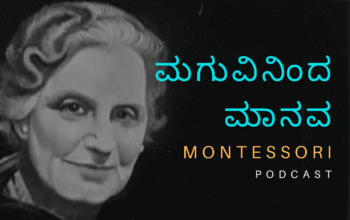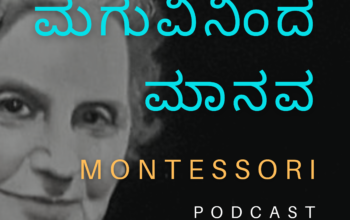Apart from Exercises of Practical Life, Sensorial Activities, Language and Arithmetic, the Montessori House of Children has other activities for cultural subjects like Botany, Zoology, History, Geography, and Physics. This episode discusses the necessity of their presence in the Montessori classroom and the manner of introduction.
Category: ಮಗುವಿನಿಂದ ಮಾನವ
Montessori Podcast
Episode 26 – Arithmetic Activities
This episode presents the significance of Arithmetic, the reasons for giving Arithmetic to children of 3 ½ years, how it is presented, the importance of 0 and 1 to 9, the decimal system and the basic combinations around the four arithmetical operations.
Episode 25 – Language Activities
This episode compares language teaching in traditional and Montessori schools and presents the steps in delivering language in the Montessori method. Discuss the phenomenon of the explosion into writing and reading, the probable mistakes children would make while writing, and the steps teachers take to help children overcome these errors.
Episode 24 – Sensorial Activities
This episode presents the senses as the Gateway to Intelligence and discusses the qualities and differences that make a human being unique compared to animals. The characteristics of Sensorial Materials, the steps followed while working with them, and their purpose is explained in detail.
Episode 23 – The Exercises of Practical Life
Constructivists believe that children can construct their knowledge when provided with the necessary support and a conducive environment. The current episode discusses the activities in the Montessori House of Children, particularly Exercises of Practical Life. The meaning, significance, and purpose of Exercises of Practical Life are examined, along with the needs they satisfy in children between 3 and 6 years.
Episode 22 – Factory, Empty Vessel and Constructivist Educational Models
This episode points out that the root cause for the current issues in the educational system is that it is based on outdated educational models. The evolution and failure of these models are discussed in detail. The third constructivist educational model is introduced.
Episode 21 – Issues in the Current Early Childhood Education in India
In India, more and more children are getting enrolled in…
Episode 20 – Child’s Martyrdom for Literacy
This episode presents how the invention of writing affected civilization leading to recorded history and the development of science and technology. In the beginning, an ordinary human being was not allowed to write. The Right to Write was achieved as a fundamental right only after many bloodsheds. After getting the Right to Write, the adults forced their children to learn instead of learning to write themselves. Many countries made learning to write compulsory for children. What was the result of this compulsory education? Tune in.
Episode 19 – The Real Nature of the Child Discovered by Maria Montessori
This episode discusses the way Maria Montessori discovered the real nature of children in the first house of children – like repetition, ability to choose, disregard for dolls, rejection of sweets, exploding into writing and reading. These qualities are not confined only to the children of Casa Dei Bambini but all Montessori children across the globe belonging to different caste, creeds, cultures and times.
Episode 18 – Inauguration of Casa Dei Bambini
Casa dei Bambini was inaugurated on 6th Jan. 1907. It was neither similar to the present Montessori Houses of Children nor the schools of those days. During the nineteenth century, it was thought that young children could not be educated as they were immature; the teacher should be highly qualified, and parents to be well educated. Casa dei Bambini proved that all these were mere misconceptions.

